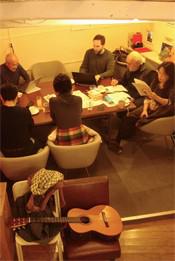Poet
Kumamoto Renshi 2010

Kumamoto Renshi 2010
(Japan, 2010)
© Jeffrey Angles
Biography
In March 2010, four prominent Japanese poets, Shuntarō Tanikawa, Hiromi Itō, Yasuhiro Yotsumoto and Wakoko Kaku, plus the well-known American poet Jerome Rothenberg, met in the southern Japanese castle-town of Kumamoto for three days of writing renshi (linked poetry). The poets had gathered together from their homes in three nations – Japan, America, and Germany – and because they were writing in both Japanese and English, Jeffrey Angles also joined them as a translator to help render the poems and facilitate communication.
Wakako Kaku, born in 1961 in Yamanashi, is a prominent Japanese lyricist and poet. Her lyrics for the song ‘Anytime, Anywhere’ featured in the Hayao Miyazaki film Spirited Away and won the Record Taishō, the Japanese equivalent of a Grammy. She has also written lyrics for many other songs, including the opening song for Ponyo by the Sea and for popular singers such as Rimi Natsukawa, Tsutsomu Aragaki, Kumiko, and Ayaka Hirahara. She has received critical recognition for developing a unique style of narrative poetry for oral recitation. She has published several collections of poetry, including Body Becoming Zero, Becoming an Adult as Big as the Sea and Tea Kettle, as well as books of essays and picture books. In 2008, she co-directed the film Yachaika with Shuntarō Tanikawa.
Jerome Rothenberg, born in New York City (USA) in 1931, is one of the most prominent voices of contemporary American poetry. He has engaged in frequent collaborations with poets, musicians and artists, and was one of key figures behind the development of the ‘ethnopoetics’ movement that flourished in the 1980s. He is also well known for his work as an anthologist, bringing together collections of English translations of oral poetry by Native Americans and other non-English speaking peoples. He has published many books, including the collections Poland/1931 (1974) and Triptych (2007), as well as several anthologies, including Technicians of the Sacred (1968) and the three-volume series Poems for the Millennium (1995, 1998, 2009). After teaching creative writing and performance studies at the University of California–San Diego for many years, he has retired and dedicated himself full time to writing while traveling around the world giving poetry performances.
Yasuhiro Yotsumoto was born in Osaka in 1959 and has been living and working outside Japan since the mid 1980s. It was while working as a businessman in the USA that his career as a poet got underway. In 2003, he won the 11th Hagiwara Sakutarō Prize for his collection Afternoon of Forbidden Words. Other books include Laughing Bug, which draws inspiration from business and financial theory, The World Congress of the Middle-Aged, which won the Yamamoto Kenkichi Award, Mud Calendar, co-authored with Inuo Taguchi, and Kid, a book of translations of the poetry of Simon Armitage. Currently, Yotsumoto lives in Germany and actively participates in poetry festivals around the world. As the editor of the Japan section of Poetry International Web, he has played an important role in introducing contemporary Japanese poetry to the world.
Hiromi Itō was born in 1955 in Tokyo and made her debut in 1977 with the collection Plants and Sky. She emerged as the leader of the “women’s boom” in contemporary Japanese poetry during the 1980s by writing several ground-breaking works about women’s sexuality and motherhood. In 1984, she relocated to the southern Japanese city of Kumamoto. In 1985, she published Good Breast, Bad Breast, a collection of essays on childrearing that is still read each year by countless mothers across Japan. Her recent book The Thorn-Pulling Jizō: New Tales of the Jizō from Sugamo won both the Hagiwara Sakutarō Prize and the Murasaki Shikibu Prize. She has been active in various genres of writing, including poetry, fiction, and essays, and she frequent gives readings and lectures around Japan. Since the late 1990s, she has resided primarily in California in the United States, but she spends part of each year in Kumamoto. In 2005, she started the Kumamoto Literary Band, which brings together the literati of Kumamoto for readings, events, and other activities.
Jeffrey Angles was born in 1971 in Columbus, Ohio (USA) and first came to Japan as an exchange student in Yamaguchi at the age of fifteen. He earned a PhD in Japanese Literature at the Ohio State University in 2004 and is now an associate professor of Japanese at Western Michigan University. His research has focused on representations of ideology and desire in the fiction, poetry, and film of modern Japan; for instance, his book Writing the Love of Boys examines representations of male homoeroticism in Japanese modernist literature. His book Forest of Eyes: Selected Poems of Tada Chimako earned the 2009 Japan–US Friendship Commission Prize for the Translation of Japanese Literature. He has also translated many other works of contemporary literature, including literary fiction, mysteries, and poetry.
Poems
Poems of Kumamoto Renshi 2010
Sponsors
























